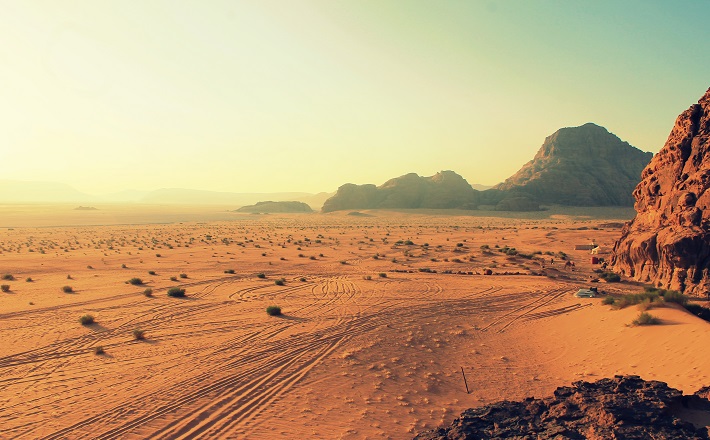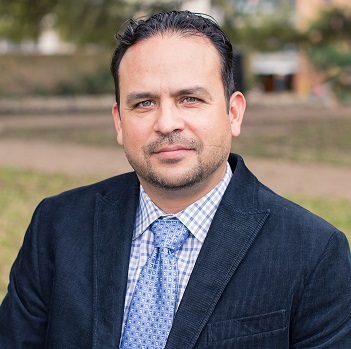Commentary on Isaiah 40:1-11
In a world divided into bordered nation-states, the migration of people tends to trigger feelings of anxiety, fear, and, for some, hatred. This emotional reflex usually finds expression in the melodramatic narratives of crisis and catastrophe that are circulated in mass media and political speeches. For many patriotic citizens in the United States, the stories of human migration are often understood narrowly as a border-crossing issue. This typically leads to the blanket title of “illegal” for all stories of human migration.
Despite what we are socialized to believe, the U.S. border is not natural to the earth’s landscape. Clearly, the earth did not come with prepackaged assembly instructions that show exactly where territorial borders should go. Instead, today’s nation-state borders are manufactured on the landscape as part of a Western terrestrial scheme that began sometime around the mid-17th century with the Treaty of Westphalia.
The story nature tells
If we were to converse directly with the natural landscapes that migrants traverse—like mountains, hills, deserts, rivers—or even hear from the plants they touch along the way, how would they portray their migration stories? If we simply look at the movements of birds, we see that nature has a dramatically different view about the migration of living beings. Since primeval times, the story nature tells us about the migration of living beings is not through a constricting framework of illegality but through ample examples of the freedom of movement, starting with the earth itself, to the clouds, to water, to birds, to fish, to animals, to insects, and even to viruses.
Perhaps the questions nature would ask us are: Why are some humans and animals unable to move freely, especially when their only desire is to stay alive another day? Why is it that as part of nature, you humans restrict nature’s caring principle of the freedom of movement?
Migrating back to mother Zion
In Isaiah 40, also known as Second Isaiah, the sixth-century prophet begins his exquisite poetic address to the Judeans who were exiled in the imperial city of Babylon. Starting in Isaiah 40:1, the healing care of colonized people sets the tone for his prophetic discourse: “Comfort, O comfort my people.” This mission of care also extends to the conquered city of Jerusalem—so much so that the prophet personifies her as a woman in need of relationship.
Then in verse 3, we encounter a bold voice issuing a command that a migratory pathway be made in the desert wilderness for God and the Judean exiles. Their destination was to return to Mother Zion. Here, the command to migrate back to the place of their ancestors was also a command to leave an oppressive empire; as Isaiah 48:20 reads, “Go out from Babylon, flee from Chaldea.”
Using parallel structure, the exilic prophet frames the two imperative verbs that correspond to the return migration of God and the Judeans (“prepare” and “make straight”) with two prepositional phrases, “in the wilderness” and “in the desert.” There are also the parallel nouns of “the way” and “a highway” placed in front of “the Lord” and “our God,” ultimately framing their migration as a faith practice. Hence, as I translate it:
In the wilderness, prepare ⇒ the way — of the Lord.
In the desert, make straight ⇒ a highway — for our God.
The freedom to leave imperial oppression also casts their return migration as an action that is closely tied to God’s comforting care offered in verse 1. Woefully, such a presentation of migration stands in stark contrast with today’s migratory experiences. For instead of being accompanied by healing care, migrants today are met with constant terror and trauma.
The caring dance of nature
Another feature of God’s comforting care was to choreograph an extraordinary transformation of a terrain that was majestic and yet dangerous for human migration. In verse 4, God set the scene before the prophet of exile in which opposing elements of the landscape join in a beautiful dance, all for the sake of making the terrain migratable. We see vast valleys rising and then far-reaching mountains and hills bowing to meet them. Added to this tectonic ballet are the drumming sounds of rubble gracefully merging to form a level paved pathway for God and the returning exiles.
The entire performance ends with all people giving a standing ovation to God, the master choreographer of this dance of care (Isaiah 40:5). Like the creation story in Genesis 1, God speaks a new creation into existence in which the colonized exiles can migrate freely and safely out of empire to a place of shalom.
Unfortunately, our current world order suppresses nature’s voice and literally keeps us from hearing her story about migration. Our manufactured nation-state borders have censored nature’s joyful dance—the freeing and peaceful movements of all living beings. Instead of seeing this story about migration, we stake fence rods into the earth to stop people from migrating. Our tortuous treatment of the earth and systems of human othering have suppressed nature’s comforting dance of the freedom of movement.
In places like the Rio Grande, the water that once roared down from the snow-melted San Juan Mountains is now screaming with the tears of drowned fathers, mothers, sons, daughters, and infants. If you stood next to the mesquite trees in the arid terrain of Brooks County, you would see that their shaggy black bark does not just exude dark sap but also marks the remains of many migrants who died of dehydration. Rather than being made safe, nature has been forced to wail in sorrow, which, sadly, also goes unheard.
In our passage, nature not only favors migration, but she is proactive in caring for the returning Judean migrants. In the end, core to God’s creation has always been care for all life, which is why nature’s story about migration is ultimately God’s story: “See, the Lord GOD comes [migrates] with might” (Isaiah 40:10).
PRAYER OF THE DAY
Holy Lord, a voice has been heard in the wilderness preparing the way for your son to arrive in this world. Prepare our hearts to receive your son and help us to prepare for his coming. Amen.
HYMNS
Many and great, O God ELW 837, GG 21, H82 385, NCH 3, UMH 148
All earth is hopeful ELW 266, TFF 47
Comfort, comfort, now my people ELW 256, GG 87, H82 67, NCH 101
People, Look East ELW 248, GG 105, UMH 202
Savior, Like a Shepherd Lead Us ELW 789, GG 187, H82 708, NCH 252, UMH 381, TFF 254
CHORAL
Comfort, comfort, John Ferguson


December 10, 2023